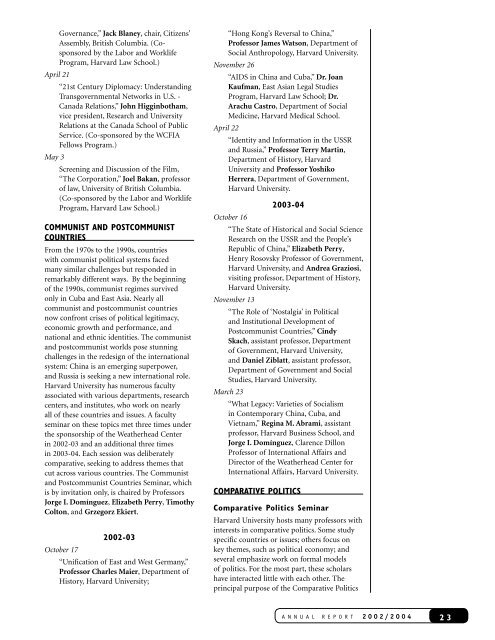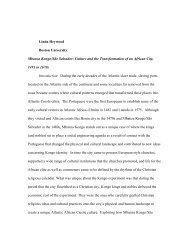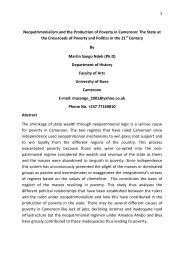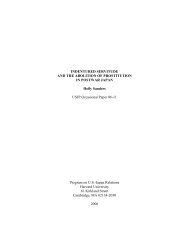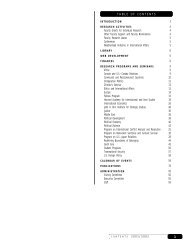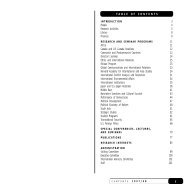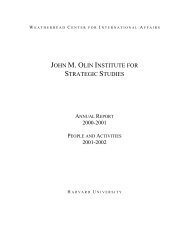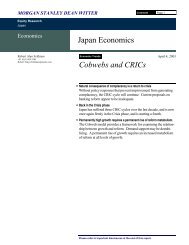2002/2004 - The Weatherhead Center for International Affairs ...
2002/2004 - The Weatherhead Center for International Affairs ...
2002/2004 - The Weatherhead Center for International Affairs ...
You also want an ePaper? Increase the reach of your titles
YUMPU automatically turns print PDFs into web optimized ePapers that Google loves.
April 21<br />
May 3<br />
Governance,” Jack Blaney, chair, Citizens’<br />
Assembly, British Columbia. (Cosponsored<br />
by the Labor and Worklife<br />
Program, Harvard Law School.)<br />
“21st Century Diplomacy: Understanding<br />
Transgovernmental Networks in U.S. -<br />
Canada Relations,” John Higginbotham,<br />
vice president, Research and University<br />
Relations at the Canada School of Public<br />
Service. (Co-sponsored by the WCFIA<br />
Fellows Program.)<br />
Screening and Discussion of the Film,<br />
“<strong>The</strong> Corporation,” Joel Bakan, professor<br />
of law, University of British Columbia.<br />
(Co-sponsored by the Labor and Worklife<br />
Program, Harvard Law School.)<br />
communIst And postcommunIst<br />
countrIes<br />
From the 1970s to the 1990s, countries<br />
with communist political systems faced<br />
many similar challenges but responded in<br />
remarkably different ways. By the beginning<br />
of the 1990s, communist regimes survived<br />
only in Cuba and East Asia. Nearly all<br />
communist and postcommunist countries<br />
now confront crises of political legitimacy,<br />
economic growth and per<strong>for</strong>mance, and<br />
national and ethnic identities. <strong>The</strong> communist<br />
and postcommunist worlds pose stunning<br />
challenges in the redesign of the international<br />
system: China is an emerging superpower,<br />
and Russia is seeking a new international role.<br />
Harvard University has numerous faculty<br />
associated with various departments, research<br />
centers, and institutes, who work on nearly<br />
all of these countries and issues. A faculty<br />
seminar on these topics met three times under<br />
the sponsorship of the <strong>Weatherhead</strong> <strong>Center</strong><br />
in <strong>2002</strong>-03 and an additional three times<br />
in 2003-04. Each session was deliberately<br />
comparative, seeking to address themes that<br />
cut across various countries. <strong>The</strong> Communist<br />
and Postcommunist Countries Seminar, which<br />
is by invitation only, is chaired by Professors<br />
Jorge I. Domínguez, Elizabeth Perry, Timothy<br />
Colton, and Grzegorz Ekiert.<br />
October 17<br />
<strong>2002</strong>-03<br />
“Unification of East and West Germany,”<br />
Professor Charles Maier, Department of<br />
History, Harvard University;<br />
“Hong Kong’s Reversal to China,”<br />
Professor James Watson, Department of<br />
Social Anthropology, Harvard University.<br />
November 26<br />
April 22<br />
“AIDS in China and Cuba,” Dr. Joan<br />
Kaufman, East Asian Legal Studies<br />
Program, Harvard Law School; Dr.<br />
Arachu Castro, Department of Social<br />
Medicine, Harvard Medical School.<br />
“Identity and In<strong>for</strong>mation in the USSR<br />
and Russia,” Professor Terry Martin,<br />
Department of History, Harvard<br />
University and Professor Yoshiko<br />
Herrera, Department of Government,<br />
Harvard University.<br />
October 16<br />
2003-04<br />
“<strong>The</strong> State of Historical and Social Science<br />
Research on the USSR and the People’s<br />
Republic of China,” Elizabeth Perry,<br />
Henry Rosovsky Professor of Government,<br />
Harvard University, and Andrea Graziosi,<br />
visiting professor, Department of History,<br />
Harvard University.<br />
November 13<br />
“<strong>The</strong> Role of ‘Nostalgia’ in Political<br />
and Institutional Development of<br />
Postcommunist Countries,” Cindy<br />
Skach, assistant professor, Department<br />
of Government, Harvard University,<br />
and Daniel Ziblatt, assistant professor,<br />
Department of Government and Social<br />
Studies, Harvard University.<br />
March 23<br />
“What Legacy: Varieties of Socialism<br />
in Contemporary China, Cuba, and<br />
Vietnam,” Regina M. Abrami, assistant<br />
professor, Harvard Business School, and<br />
Jorge I. Domínguez, Clarence Dillon<br />
Professor of <strong>International</strong> <strong>Affairs</strong> and<br />
Director of the <strong>Weatherhead</strong> <strong>Center</strong> <strong>for</strong><br />
<strong>International</strong> <strong>Affairs</strong>, Harvard University.<br />
compArAtIve poLItIcs<br />
comparative politics seminar<br />
Harvard University hosts many professors with<br />
interests in comparative politics. Some study<br />
specific countries or issues; others focus on<br />
key themes, such as political economy; and<br />
several emphasize work on <strong>for</strong>mal models<br />
of politics. For the most part, these scholars<br />
have interacted little with each other. <strong>The</strong><br />
principal purpose of the Comparative Politics<br />
A n n u A L r e p o r t 2 0 0 2 / 2 0 0 4 2


